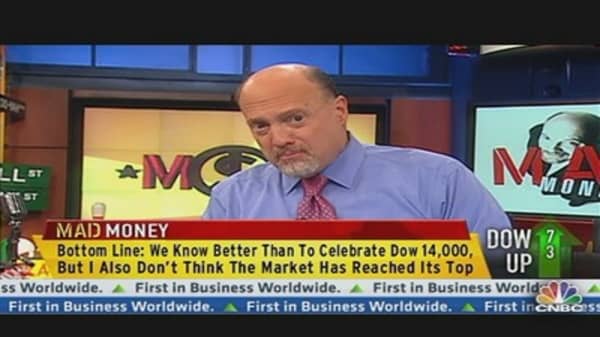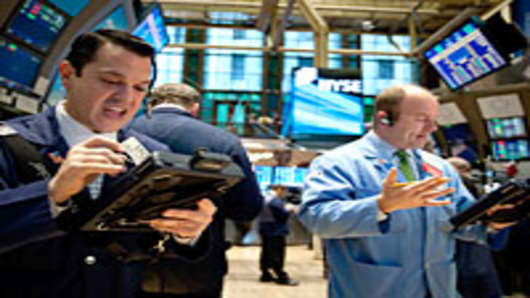"The last time we saw these levels in the Dow, tech components Intel, Microsoft, and Hewlett-Packard, were all riding high on the personal computer," Cramer said.
"Today, in 2013, the smartphone, and the tablet, have cut deeply into their businesses. They have gone from overvalued growth stocks to very inexpensive value stocks with, at least in the case of Intel and Microsoft, plenty of cash, and Hewlett-Packard down 44% last year may not be nearly as bad off as that decline would indicate," Cramer concluded.
Cramer also noted that in 2007 the Street valued pharmaceutical companies as growth entities, therefore investors were paying sizable premiums for Pfizer, Johnson & Johnson and Merck.
"Now, the first two are just getting back to where they were and the last isn't even near it. Ponder these apples to apples comparisons," Cramer said. "Pfizer had free cash flow of $11 billion back then, now it should have $20 billion this year. JNJ has gone from $12 billion in free cash flow to about $16 billion, and Merck, which, remember, isn't back yet to where it was, has $12 billion in free cash flow, versus just $5.9 billion in 2007."
Cramer also said consider that AT&T, the original seller of the Apple iPhone, is down 8 points from where it was back then, even though it has created what he considers more value. And Verizon, which has added the iPhone and built out its wireless network, is barely up from back then, despite very nice dividend increases by both companies.
The stocks mentioned above don't seem expensive.
"In fact, if anything I could say there are plenty of Dow stocks that don't belong as low as they are. Alcoa's a fraction of its $44 price tag back then, but its free cash flow has gone from negative $500 million dollars to a positive $200 million. 3M is a much better company now than back then, with a much broader product portfolio, just took out its high. And how much more time does General Electric have to spend at roughly half of where it was when it has correctly addressed the over-reliance on financial profits and embraced real industrial profits in a consistent way?"
But that's not to say every stock in the Dow is trading at either a real or relative discount to its 2007 counterpart.
"Home Depot's climbed from $41 to $67 and IBM has advanced from $120 to $205. Disney leaped up to $54 from $34."
Cramer, however, said in each and every case the stocks deserve these price improvement.
--------------------------------------------------------------
Read More Cramer
Jim Cramer: Problem That Stocks Are at 5-Year Highs?
IPOs—Cramer Separates the Best From the Rest
Herbalife—The One Question That Matters
--------------------------------------------------------------
Of course the Dow is not exactly the same as it was back in 2007.
Some tried and true components were booted out of the index since that time including AIG, Citigroup and General Motors. Conversely, the Dow's added Bank of America, Cisco, Chevron, Travelers and United Health.
"Again, none of these stocks can be considered expensive, particularly Bank of America, even after the stock more than doubled last year," Cramer said.
What's the bottom line?
Absent a very negative catalyst, the Dow components don't appear to be expensive. And if that's the case, unlike last time when the Dow was too high, "we may look back at this juncture and find that we were too low," said Cramer.





